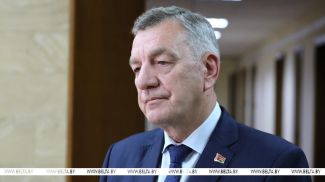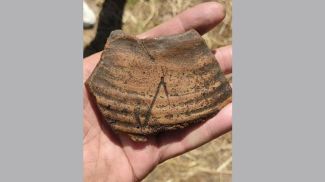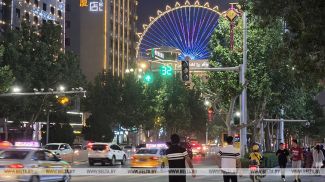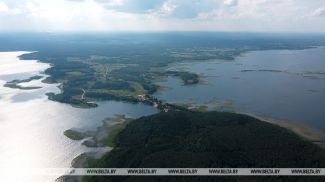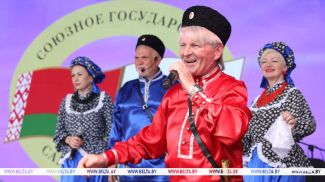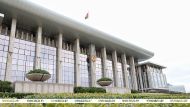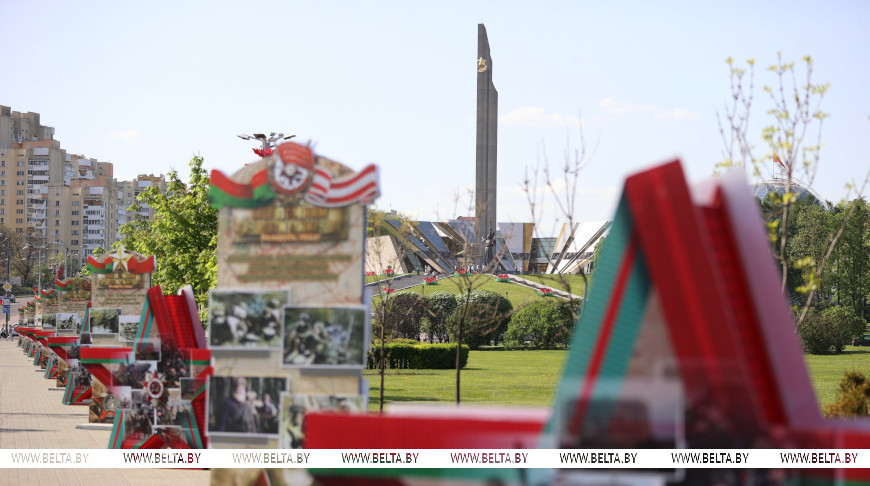
MINSK, 9 May (BelTA) – Today Belarus is celebrating Victory Day, one of the most important holidays in the history of the country. For Belarusians this is a sacred holiday, a day of remembrance, utmost respect and gratitude to Soviet soldiers, homefront workers, underground resistance fighters, to all those who made the victory possible.
9 May 1945 marked the Soviet Union's victory in the Great Patriotic War which lasted for 1,418 days and nights. The Soviet people played a decisive role in the fight against fascism and bore the brunt of the war and determined the future of the world civilization.
Belarus was the first of the Soviet Union republics to face the massive attack of the fascist invaders, becoming the scene of the largest battles. The first to come under attack were border guards and advanced units of the shield forces. The enemy aircraft bombed railway junctions, airfields, Brest, Grodno, Volkovysk, Baranovichi, and other Belarusian cities. The defenders of Brest Fortress, Minsk, and Mogilev put up a fierce resistance. Soviet Katyusha rocket launchers were used against the enemy for the first time. It happened near Orsha on 14 July. The resistance in the territory of Belarus at the beginning of the war thwarted the German plans for a rapid offensive on Moscow.
However, despite the courage and heroism, the territory of Belarus was occupied by September 1941. In Belarus the enemy faced the resistance unprecedented in scale and persistence. Over the years of the Great Patriotic War the national partisan movement involved more than 374,000 people. The anti-fascist underground movement numbered over 70,000 members. Belarusians, representatives of other nations of the Soviet Union and anti-fascists from European fought against the enemy as part of the partisan groups. During the war there were about 30 partisan zones which the Germans could not occupy.
Belarusians was one of the nations hit the worst by the war. The Nazis carried out about 180 punitive operations in Belarus. The village of Khatyn has become a tragic symbol of the mass extermination of the civilian population. During the investigation of the criminal case into the genocide of the Belarusian people, it was established that there were more than 580 death camps on the territory of Belarus. Trostenets was the largest in the entire occupied Soviet territory. At least 546,000 people were killed there, according to the latest data of the Prosecutor General's Office of the Republic of Belarus.
During the occupation, the enemy destroyed 12,348 villages completely or partially. 288 villages and hamlets shared the tragic fate of Khatyn, i.e. were burned down together with their inhabitants and never recovered.
Belarus lost more than half of its national wealth in the war. The human losses were enormous. During the years of Nazi occupation from 1941 to 1944, more than 3 million civilians and prisoners of war were exterminated on the territory of Belarus, more than 377,00 people were taken to Germany for slave labor, many of whom died as a result of unbearable working conditions, deprivation and torture.
Belarus has been preserving the memory of the Great Patriotic War throughout the post-war years. The capital of Belarus, Minsk, among 12 cities of the former Soviet Union, was awarded the honorary title Hero City for the heroism and courage displayed in the fight against the aggressors. The Brest Fortress was awarded the Hero Fortress title. Other cities of Belarus were also honored for heroism. Numerous obelisks, monuments, memorial complexes and the Mound of Glory testify to the sacrifices of the war and the feat of the people. The Belarusian State Museum of the History of the Great Patriotic War is an important scientific and cultural institution.
In the history of Belarus there was not a war more cruel than the Great Patriotic War, there was not a feat bigger than the feat of the Soviet soldiers who defended the Motherland, who saved the humanity from the Nazism. The memory of the war and the Great Victory shall not fade away: it is forever inscribed in the history of the Motherland and every Belarusian family. The tragedy and the Victory are the eternal source of pain and bitterness, pride and glory of the Belarusian people.
We move further and further away from the Great Patriotic War, but the memory of the feats of those who died in battles, the sorrow for millions of innocent victims and the tragedy of the occupation shall forever remain in the hearts and souls of the older generation, their children, grandchildren and great-grandchildren.
Victory Day is traditionally celebrated for several days across the country. Celebrations feature concerts, festivals, exhibitions, patriotic campaigns, song contests, thematic and informational lessons at schools. On the eve of the holiday Belarusian cities host flower ceremonies at the burial places of soldiers and concentration camp prisoners to honor the memory of those who died during the Great Patriotic War.
War veterans are honored throughout the country. Today, Belarus is home to 1,100 of war veterans and about 7,400 citizens who suffered from the consequences of the war (90% of them are former concentration camp prisoners).
The program of the 79th anniversary of the Victory in the Great Patriotic War will include more than 25 festive events in Minsk on 9 May. Concerts, workshops, arts and crafts exhibitions will be organized in different parts of the city. The main festival venue with traditionally be the area near the Palace of Sports. Famous Belarusian artists and amateur art groups will perform on stage.
The celebrations will wrap up with spectacular fireworks at 23:00 at six different parts of the city.




